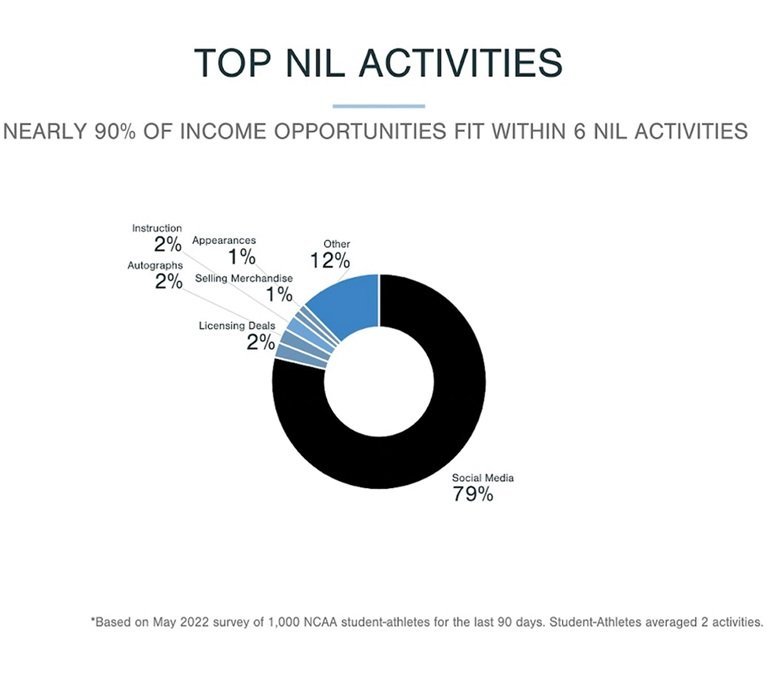NIL x Social Media
Name, Image, Likeness Insider uses proprietary data and expert insights to explain the latest NIL developments.
SOCIAL MEDIA IS A POWERFUL FORCE AMONG NIL ACTIVITIES
Although brands are continuing to expand how they are activating student-athletes, social media remains the main tactic in nearly 80% of NIL partnerships. That percentage has been slowly contracting each month since its high of 90% about a year ago.
The good news for brands is that student-athletes are over-delivering on social media compared to other other social media influencers (someone who encourages their followers to take action.) To review, engagement rate is equal to the number of interactions with a post divided by the number of account followers and multiplied by 100. On Instagram for example, “interactions” are likes and comments.
Acceptable engagement rates throughout the social media influencer “industry” include:
Less than 1% engagement rate = low
According to Influencer Marketing Hub’s studies, 1.7% is the average engagement rate for social media influencers followed by between 5,000 and 20,000 followers (which most closely matches the majority of student-athlete data I studied)
1% - 3.5% engagement rate = good
3.5% - 6% engagement rate = high
Above 6% engagement rate = very high
Why It Matters: Based on data collection from my NIL Research Poll, I estimate that the average engagement rate of student-athletes posting on behalf of brands is 5.4%. In August 2022, SponsorUnited did a similar analysis and their result was 5.14%. I'll repeat it: student-athletes are over-delivering on social media.
BRANDS’ MOST COMMON SOCIAL MEDIA MISTAKE
I have no data to support this, but I review NIL deals every day, sometimes all day. The most common mistake brands are making when activating their student-athlete partnerships is repetitive social content. I just made that term up. What it means is that the brand’s content team develops 2-3 sentences of copy (to be written or spoken) and distributes it to every student-athlete on their NIL roster. So far, so good. But then they give them explicit directions to use the copy “as is.” So not only is the content void of any of the athlete’s personality (for which the brand paid for!), but now that post just became a repetitive ad.
Why It Matters: This matters now more than ever as social media, most famously TikTok, serves up content based on a user’s interactions with content it identifies that the user likes or doesn’t like. So if you liked that video of the soccer player at “State University” talking about “Brand X”, don’t be surprised a few minutes later to see a basketball player at a different “State University” saying the exact same thing - word for word - about “Brand X!” My advice to brands: let student-athletes have the freedom to make the social content their own. It will be better for your brand because it will be a better experience for the end-user.
STUDENT-ATHLETES’ MOST COMMON SOCIAL MEDIA MISTAKE
It’s been over a year of NIL and still few student-athletes who participate in social media-related NIL activities know that they are obligated to follow Federal Trade Commission (FTC) rules. The FTC’s mission is to protect consumers. And in that role, they have developed Endorsement Guides to help endorsers (now including student-athletes) to stop deceptive ads. The FTC’s rules for social media influencers are straightforward and I’ve summarized them here:
Student-Athletes cannot talk about their experience with a product unless they actually have experience with it; what they talk about must be their honest belief
Student-Athletes cannot make statements about a sponsor’s product that the sponsor cannot prove
Student-Athletes must always disclose that they have a relationship with the sponsor so that people can weigh the value of their endorsement
Why It Matters: Failure by student-athletes to disclose their relationship with a sponsor puts the student-athlete in danger of the FTC’s financial and other penalties.
I consult with brands, agencies, and sports organizations on Name, Image, and Likeness - and provide on-demand courses for parents, athletes, coaches & administrators. I teach NIL in College Sports at the University of Vermont’s Grossman School of Business. I’m a SportsBusiness Journal Forty Under 40 Award winner and former co-founder of the marketing agency Fuse, which I operated for 20 years before selling in 2019.




